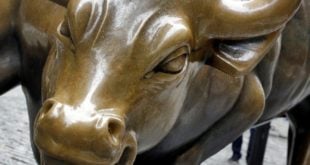Sometimes the most simple explanations are the best, and also the least expected.
Citi is out with a note suggesting that recent turmoil in foreign currencies is forcing these disheveled governments to pare down their FX reserves, sell U.S. Treasuries, in order to help defend their own currencies. The result has been one of extraordinary tightening, leaving stocks in the sewer, floating about with the rats and feces.
A siphoning of the global liquidity punch bowl is fueling the 2016 downdraft in global equities, says Matt King, Citigroup Inc.’s head of credit product strategy, jumping on a thesis first promulgated by Deutsche Bank in September.
Individual stock markets aren’t responding primarily to domestic liquidity conditions but rather to the state of monetary policy globally, King reasons.
Although direct economic linkages between emerging and developed markets are minuscule, in many cases, all equity markets have been affected by central bank stimulus—leaving them interconnected as the provision of liquidity becomes less ample.
After global stocks crumbled following the relatively small devaluation of the Chinese yuan in August, Deutsche Bank’s George Saravelos floated the idea that sales of foreign exchange reserves by emerging-market central banks, particularly China’s, were the driving force behind this turmoil.
Central banks in the developing world have divested some of their foreign exchange reserves in an attempt to prop up the value of their domestic currencies amid the carnage in commodity prices. This development, in theory, puts upward pressure on U.S. Treasury yields as central bankers sell the debt, effectively tightening global liquidity and weighing on risk assets.
“Previous doubts as to whether such ‘quantitative tightening’ mattered for developed markets have unfortunately been addressed, at least in an empirical sense: the quality of the correlation speaks for itself,” he wrote.
Emerging market central bankers are draining liquidity even as their peers in Europe and Japan are refilling the punch bowl, King observes, causing the pace of net purchases to decline considerably:
Spreads on junk-rated corporate bonds also closely track total central bank liquidity, according to Citi.
“The fact that global central bank liquidity correlates so well with market movements raises a number of awkward issues,” the strategist writes. “Not only does it point to further downside if money continues to leave emerging markets,” he says; it also may “suggest that [developed market] central banks are not fully masters of their own destiny.”
In conclusion, we live in a global economy, one that is interlocked with one another. The domino effect is real and or central bank is to blame for the FX disaster. If the Fed would back off and foster a weaker dollar environment, the spigot would be turned on and we’d enjoy a 1,000 point rally.
If you enjoy the content at iBankCoin, please follow us on Twitter





So how much has China pumped into their market this past year?
over $500 billion
If foreign central banks have been selling treasuries, why is TLT doing so well?
It is being offset by people looking for safe haven.
US treasury yields should be much lower, if compared to european counterparts.
Thus there is no upward pressure on treasury yields, and Citi is full of crap.
not true. As foreign FX reserves are drawn down, this has a deleterious effect on global money supply.
It is indisputably true that there has been no upward pressure on long or intermediate-term Treasury rates (as Citi contended) either during this selloff or in the prior several months. You need only look at the charts of TLT and TLH to see that.
Secondly, buying/selling of US Treasuries by the PBOC has a very different impact on US$ supply versus when the Fed does it, because the Fed creates/destroys US$.
PBOC transactions with any counter-party other than the Fed are zero-sum in US$ terms. And as a practical matter the US$ generated by PBOC Treasury sales won’t just sit in the PBOC vault (at least not for long). While PBOC Treasury sales *may* result in fewer RMB in circulation (when they use the US$ to buy RMB) that is not always the case. For example, when China sells Treasuries to diversify their reserves into oil, gold, Chinese debt, Euro, etc RMB supply does not change.
Looks like we are getting a setup to pump energy and finz at 52 week lows? Is the fed on ether in a certain time machine regarding inflation?
This makes a lot of sense, except for the upward pressure on treasury yields haven’t been showing up. But as you said Fly, it’s being offset by safe haven buys, which says to me institutions and retail aren’t scared shitless because if they were, they’d just sit in cash. Although, clearly the attitude has been risk off for a while.
Duh, Doesn’t everyone already know this?